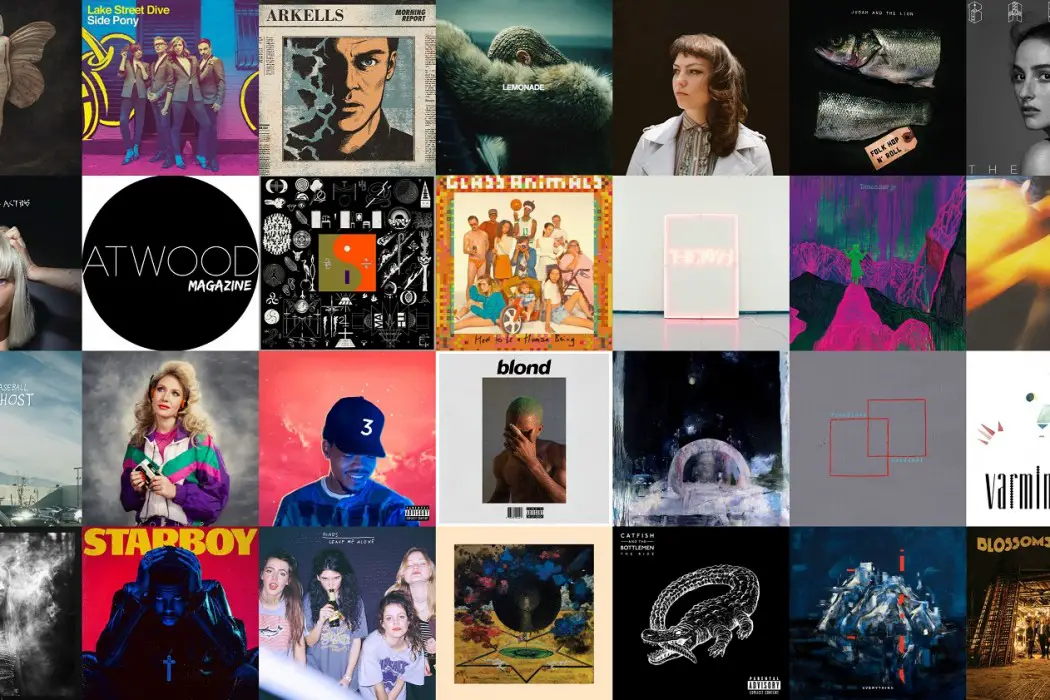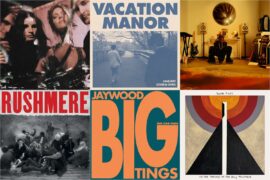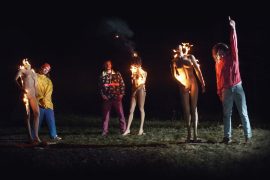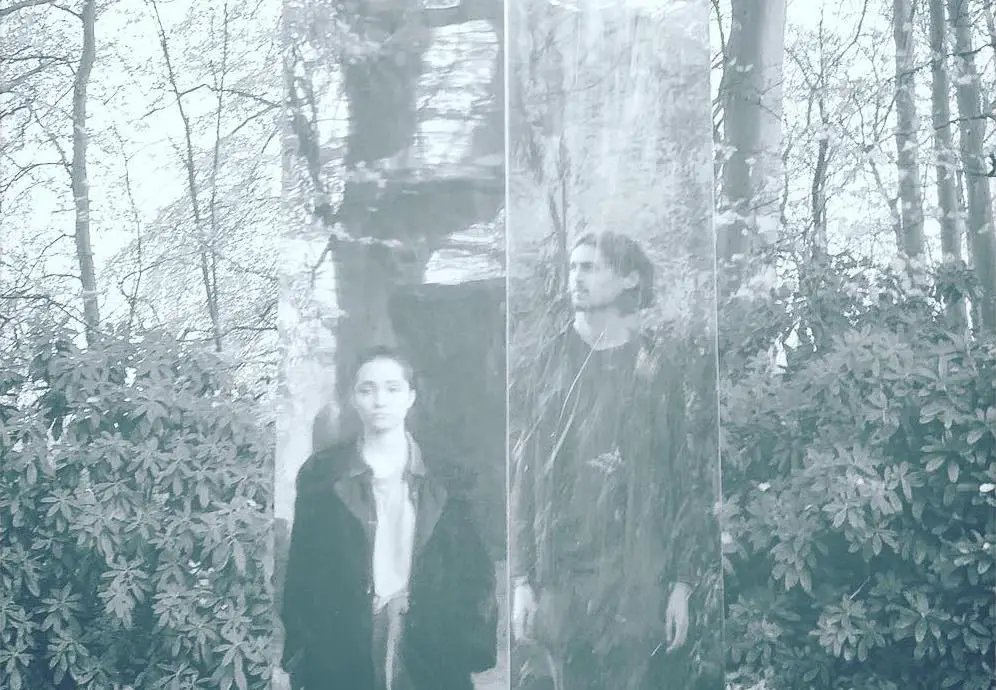From all of us here at Atwood Magazine, we wish you a happy and healthy new year. 2016 was an emotional, divisive year for many of us. Through good moments and bad, we had music to keep us company, keep us sane, and be our guiding light.
We remember those artists whom we lost with fond memories and deep appreciation for their contributions: David Bowie, Prince, Leonard Cohen, George Martin, Sharon Jones, George Michael, and more. They live on in their music.
For every loss that cast its shadow, there was a new voice full of life, light, and energy. We look to new and emerging artists for inspiration, hope, and so much more. In its universality and timelessness, music is and will be forever changing.
2016 was an impressive year for new music, with both young and established artists challenging traditional ideas of genre and release. Streaming has finally become a profitable venture for the music industry, and it’s changing the whole system – giving artists and labels plenty of room to experiment. Meanwhile, 2016 saw just as much experimentation occurring in the studio, with artists redefining what it means to make a great album.
And in other instances, some artists just made really great records. Atwood Magazine is proud to present our staff-procured list of 2016’s Albums of the Year, in no particular order. These are our favorites – the albums that influenced us the most. With 2016 at an end, we look back on the year’s contributions to the music world. (by Mitch Mosk)
“If you listen to an album from start to finish, then it should be much more powerful than just any of the songs on their own,” Glass Animals frontman Dave Bayley told me in our interview two weeks before the English group’s sophomore record was released. This holds especially true for Glass Animals’ own music: How to Be a Human Being is an impressive work of art that combines unique sonic tapestries with diverse storytelling, complex characterization, and clever songwriting. The genre-defying “indie”/”electronic” band employ everything from heavy tribal drums to psychedelic textures and even video game sounds in what one might describe as a carefully-constructed series of human vignettes: Each song is a different story about a different character, a concept that came out of the band’s heavy touring and “meeting hundreds of people daily.”
What’s most fascinating about How to Be a Human Being is its exploration of humanity. Our feature on Glass Animals dubbed their record “The Musician’s Guide to Human Beings” because of the band’s impressive ability to create these ten multi-dimensional personas, and then go on to share their stories in such a way as to evoke strong feelings and connections in the listener. “Life Itself” opens the record with a first-person narration of quasi-destitution; I say quasi, because the narrator seems content in this life, exhibiting few (if any) regrets. Album closer “Agnes” brought me to tears more than once in its poignant plea to a drug-addicted friend; Glass Animals were not previously known for their lyrics, but Dave Bayley approached How to Be a Human Being completely the opposite from how he approached the band’s sonically-focused debut Zaba, this time crafting vocal lines, vocal melodies and lyrics first and then pushing the sounds around it. As a result, Glass Animals’ sophomore effort is both lyrically and musically rich, allowing for listeners to connect to the music and the band on multiple levels.
How to Be a Human Being goes well beyond the boundaries of a music album. Glass Animals’ inspired redefinition of music consumption in the 21st century finds the band giving each character from each track their own website (at the time of this writing, three out of ten websites are available). The band went so far as to give the lazy day, couch potato song “Season 2 Episode 3” its own video game (and app for iOS and Android). In crafting so many ways to interact with the music, Glass Animals have certainly given their songs a certain longevity – but this isn’t just about maintaining relevance months after an album’s release. Music has for too long been a one-dimensional experience; Glass Animals, like other pioneers in their field, are experimenting with ways of breaking the mold, to interact with fans on new levels that go well beyond a Spotify stream or iTunes download.
No one could have anticipated the breadth and depth of Glass Animals’ How to Be a Human Being, but its colorful, engaging (and catchy) array of sounds and thoughtful portrayal of humanity (and technology) give it the honor of being my album of the year. – Mitch Mosk
In this ever-changing world of music, you would be hard-pressed to find a band that succeeds in squashing preconceived ideas more than Brooklyn-based four-piece MOTHXR. Still very much in their infancy, MOTHXR has managed to shine as a bright star in a dark indie sky, fostering matchless musical talent and commendable technical ability that should not be ignored. They are magnetic, enchanting, and unremittingly narcotic.
Only first coming together in 2014, the group is still incredibly new to the music scene and is still finding their footing in the realm of indie music. Nonetheless, they have successfully begun firmly planting themselves, especially with their debut album Centerfold released on February 26.
Centerfold is a sonically intoxicating blend of technically-perfected backing tracks with hauntingly enrapturing vocals, and ultimately wins out as being one of the most prominent indie records to be released as of late. Its unique blend of sounds–a complementary mix of infectious instrumentals, sagacious lyricism, and lead singer Penn Badgley’s mesmerizing vocal prowess–allows Centerfold to stand firmly at the forefront, enchanting its listeners with every meticulously-crafted chord.
Through its inimitable technicality and acute perceptiveness of itself, Centerfold ultimately proves that it is able to transcend traditionalism altogether. Centerfold is an addictingly melancholic dream; a glimmering, matchless indie gem in the midst of otherwise homogeneous dregs of sound. – Maggie McHale
With the exception of a few globally-minded music journalists, very few people seemed to be paying attention to Spanish garage rock until Hinds came along. With the release of the Madrid foursome’s debut album Leave Me Alone, attitudes about music in Spain, garage rock, and more changed almost immediately. Leave Me Alone’s infectious energy and unique blend of garage rock and pop reminded the world that garage rock could retain its edge and quality of sound and still be fun. (In the world of sad-kid indie aesthetics, does anybody remember fun?) With cheeky lyrics like “Bamboo’s “I know you’re not hungover today, you’re classifying your cassettes” and Chili Town’s “I am swimming in the dark/’Cause all your friends are sharks” set amid clever guitar interplay and frontwomen Carlotta Cosials’ and Ana García Perrote’s shared, often-interlocking vocals, Hinds crafted an album full of signature melodies that have a knack for sticking in listeners’ heads.
Hinds’ success with Leave Me Alone has done more than just revitalize garage rock. It’s reminded the world that music made by four women can (garage) rock—hard. How many debut albums by all-male garage groups have allowed their group to tour and headline festivals in Europe, North America, and Australia—multiple times over? In addition, Hinds have opened a door not just for women in garage rock and pop but for all alternative music produced in Spain and in Spanish-speaking countries. Though their music is mostly in English, their meteoric success has kicked open the often-closed door between music produced in the English-speaking world by English-speakers and everywhere else. Leave Me Alone, besides being one of the year’s most refreshing debut records, has opened doors that most people didn’t even realized were closed. And if Hinds has anything to say about it, those doors will remain open as long as they’re making music. – Lindsay Call
I like it when you sleep, for you are so beautiful yet so unaware of it is bold all around. From its ridiculously long title, which broke the record of longest-titled album to ever reach #1 in the US, to the wide array of genres it slightly touches upon throughout its 17 songs, The 1975’s sophomore record is definitely one to remember. Frontman Matty Healy’s honest lyrics are a transparent exploration of his life, speaking about topics like cocaine addiction in “UGH!,” a slightly ironic but thoughtful exploration of the cult of celebrity in “Love Me,” atheism and religion in “If I Believe You,” his mother’s postpartum depression in “She Lays Down,” politics, the media, and compassion in “Loving Someone,” and falling out of love in “A Change of Heart.” The album is a one-hour-and-18-minutes-long journey into The 1975’s world, a world which collects influences from genres like R&B, gospel, and pop, is raw and unapologetic, and leaves you yearning for another journey back just so you can discover all its hidden corners. I like it when you sleep… is remarkable for being a great reflection of where youth stands regarding music today — it is a record which one can dance, sing, and cry to, a record which provokes you to think (be it about its raw lyrics or its lack of genre) and most of all, it is a record which shows that taking risks and being ambitious does, indeed, pay off. – Nicole Almeida
It feels inappropriate to discuss 2016’s music releases without addressing Bon Iver’s experimentally-glorious, technologically challenging and overall fascinating album 22, A Million. The third full-length release from the Wisconsin-based “indie folk” band is awash in symbolism, numerology, and metaphysical questioning – and that’s just the album cover. Deeply personal thoughts and feelings are shrouded in cryptic lyrics and chaotic music, but that doesn’t stop 22, A Million from being a profound, oddly accessible work of art.
22, A Million is truly far more than the sum of its parts, best listened to in its entirety rather than through individual singles. As emotionally complex as it is sonically creative, the album feels quite like the right thing at the right time, a convoluted and often confusing mesh that mixes Bon Iver’s traditional soft and acoustic sound with often harsh, sonically scattered electronics. Sometimes the old sound gets lost in the new one; warm pianos and guitars fade while cold, frightfully indecipherable sounds take over, as on the otherwise lovely “21 M♢♢N WATER.” But elsewhere on the album, be it the digital voice-fueled “715 – CR∑∑KS” or the captivating ballad “29 #Strafford APTS,” Bon Iver seem to strike a satisfied balance between acoustic and electronic instrumentation. Nevertheless, a battle brews throughout 22, A Million between the two distinct, often categorically and culturally separate “types” of music, and Bon Iver portray that well.
Bon Iver fans who loved Bon Iver because they offered a certain sound or vibe may feel slighted by the band’s most recent output, but 22, A Million is a signal of times a’changing, the breaking of a mold whose passage is long overdue. There is beauty in chaos, and there is beauty in beauty; Bon Iver found a way to blend those worlds, taking back their identity and proving (yet again) to all who care that art defies household labels. Most of all, this album reminds us that art is not a puzzle for us to solve; it is an experience for us to receive. Everyone will take something different out of 22, A Million, and that might be Bon Iver’s greatest achievement yet. – Mitch Mosk
One of the catchiest albums of 2016, Catfish and the Bottlemen made indie rock fun again with their sophomore album, The Ride. The band jams out, sounding like a younger musical sibling to The Kooks with slick guitar playing and splashy rhythms. Not straying far from the band’s first album, The Ride showcases an energetic side to rock and roll. Van McCann’s vocals carry along tuneful hooks and explosive energy. It’s a record that seeks to bring joy to the band’s loyal followers while simultaneously aiming to stay within Catfish’s comfort zone.
The record is bouncy and entertaining. It’s authentic in its narratives about parties, chasing girls, smoking and shows. It’s true to what the band lives and breathes while they tour. It doesn’t try to be anything overwhelmingly deep or thought-provoking, instead shining in its moments of straightforward lyricism. “The Ride” is formulaic but in the best way possible, bringing some comfort to a year that was wrought with uncertainty. It gave you something to count on. Listening to “The Ride” is a bubbly form of escapism. It’s dependable. Emulating Oasis with jangling guitar solos and infectious choruses, it’s a record that’s both anthemic and contagious. Punchy tracks like “7”, and “Oxygen” make you want to sing at the top of your lungs, while “Emily” and “Twice” have you bopping along the journey until it’s all wrapped up with a bow on crowd-pleaser “Outside.” – Natalie Harmsen
Chance the Rapper’s rise to prominence this year was nothing short of meteoric. With the release of his third mixtape, Coloring Book, Chance put the music industry on alert. And after a change in requirements that widened Grammy consideration to include streaming-only albums, Chance secured several nominations, including Best Rap Album and Best New Artist. Even in a year filled with releases from Kanye West, Kendrick Lamar, and Beyoncé–just to name a few– Chance the Rapper’s mixtape shined through. On Kanye’s “Ultralight Beam,” Chance raps “this is my part, nobody else speak.” And although that was one of the most talked about verses of the year, once “Coloring Book” dropped a few months later, Chance truly silenced the rest.
Staying true to his anti-label, not-for-sale mentality, Coloring Book is a perfect embodiment of Chance the Rapper. It is bright, outspoken, and unapologetically faith-driven. He shows off his remarkable range, pulling off both the powerful “No Problem” and the stripped back “Same Drugs” and making it look easy. Jam-packed with features ranging from powerhouses like Kanye West and Lil Wayne to up-and-coming artists like D.R.A.M. and fellow Chicago rapper Noname, at times Coloring Book feels more like a collective celebration of music than a solo project. But it’s Chance’s voice that ties the whole mixtape together; his unbending optimism serving as a beacon of hope in a rather tumultuous year. He reminds us that music is “all we got.” And with music like his, we’ve sure got a lot. – Kaitlyn Zorilla
The Altar is by far one of the most underrated albums of the year, released by one of the most underrated artists of our generation. Banks is brutally honest, bare, and vividly depicts her experiences through her music to heal, as well as help other people–the essence of a true goddess. Through the album, her listeners are able to witness the journey of her growth while uncovering ways in which to grow themselves. As simple and honest as her words are, each song is inflicted with a glimmer of pain that makes it evident that it was hard for her to write. The truth in her words showcases her humanity, something that a lot of artists tend to lose sight of. The Altar is mind-boggling, empowering, ethereal, and tells a story that may have hurt to write, but has done a lot to heal people everywhere. – Tracy Smith
Lido is EVERYTHING. The Norwegian artist becomes the subject of his own work throughout his 11-track debut–a concept album that doesn’t focus on his last break-up, but the swirling thoughts and muddled emotions that came after. Each track represents a different feeling, perspective, and attempt at understanding what this loss of love means; a voyage through Lido’s personal stages of grief. Every sound, voice and lyric we hear on the album contributes something significant to Lido’s story. He uses the vocalists as different representations of himself–Jaden Smith is Lido’s true self speaking to the world, while his own voice embodies his internal emotions, and so forth. By creating a labyrinth made up of layers and themes so personal they can be precious only to Lido, Everything becomes an album that can be enjoyed by all, but only truly understood by its maker.
Everything stands out from the crowd of break-up songs and diss tracks through its unfiltered honesty and depth. On “You Lost Your Keys,” Lido gives us the last five minutes of an eight hour studio session where he couldn’t decide what key the song should be in. He’s showing us his frustration rather than telling us, and he leaves nothing, not even a creative block, out. In moments like these it’s easy to understand that Lido isn’t placing blame or requesting apology; that the album came about as a result of love, not in spite of it. Musically, it’s a motley of rap, experimental electronic, jazz, orchestra and probably more. But from the soft whispers on “Catharsis” to the loud, frantic rhymes of “Citi Bike,” Everything comes together as a complex, abstract and beautiful representation of heartbreak and the subsequent search for clarity. – Alex Killian
Cribbing a title from a Walt Whitman poem, Big Ups’ album Before A Million Universes was a blast of ferocious noise and righteous anger that came in a year where many of the biggest records released kept things more sedated or soulful. Mining a strand of indie rock that started with Slint and continued through post-hardcore groups like Drive Like Jehu, Big Ups expanded on the promise of their debut, the brilliant Eighteen Hours of Static, by mediating the moments of fury with cooly-crafted moments of quiet, off-kilter time shifts, and unconventional chord changes. The total effect was one of stunning virtuosity and unrivaled emotionality.
2016 saw a swell of pop-punk and emo inspired acts like the Hotelier and Modern Baseball dominate the conversation in indie rock, buttressed by performers like Angel Olsen and Mitski, who hew a little closer to the singer-songwriter mold. Big Ups don’t really fit into either of these types, and that’s important. Like Mitski, they come from the East Coast DIY underground and have a strong sense of song-craft, but unlike her, they take their music to dark, dissonant, razor-edged extremes. Like the emo groups, the band’s work is introspective and emotional, but it’s lyrically more oblique, challenging the listener to engage with and make sense of it. There’s nobody else doing quite what Big Ups does, which makes them a singularly powerful force in indie rock, as well as a unique treat to listen to. – Ross Finney
Over the past few decades it feels as if the world has turned its back on rock and roll. Rock bands no longer dominate the airwaves and arena stages, and the new-age alt rock is all but ignored by the masses. Pop music has taken center stage and is constantly filling the radio waves with largely overlayed half-assed pop hits. With that being said, that is why Arkells’ fourth album Morning Report is such a breath of fresh air into the dying lungs of alt rock. It is one of those albums where every single track brings something different to the table; it is a melting pot of sounds and influences that somehow find a way to flow effortlessly together. The album is a reflection about everything that life has to offer, from the trials and tribulations of relationships to the beauty of good friendships. Morning Report is a change of pace for Arkells–they pushed themselves far outside of the box even when it would have been a thousand times easier to stay safely inside and crank out a High Noon 2.0. Arkells have shown that while it may be easier for an artist to stick to their sound, it is worth it to take the risks and make the change. Morning Report overall is a homage to all of the messy, heartbreaking, and beautiful things that life has to offer. So as long as Arkells are making music, alt rock isn’t going anywhere anytime soon. – Shannon Ruzgys
Sometimes, I’m the kind of pretentious music dork who cares about the term “experimental” when it comes to music. There’s something so great about digging into the weird and finding music that doesn’t follow the normal rules,even if it means awful noise, dissonant non-melodies, or things that border on unlistenable. Of course, when music becomes obsessed with experimentation in these ways, it can become rote. There are only so many minutes of drone before things get boring. But in the middle of all that, there are those little bits that make it all worth it, moments of surprise. And few albums I’ve ever heard have surprised me like Anna Meredith’s Varmints.
In addition to its consistent excellence, Varmints is one of the most unfathomably varied albums I’ve ever heard. Meredith, a classically trained composer, begins her album’s first song, “Nautilus,” with an abrasive, minimalist synthesizer loop, before adding a foreboding orchestral string sequence. But three and a half minutes in, a low and grooving bass synth begins to wub-wub its way into the song, joined quickly by drums that bely the way that the album is not going to be the pointy-headed intellectual exercise it started with. The rest of the record gives way to catchy and even anthemic electro-pop that shifts in and out of the avant-garde sensibilities of the opener.
It’s “experimental” music of the most enthusiastic sort. It is music that doesn’t let itself be bogged down by its weirdness, that is unafraid to embrace pure enjoyment, but insists on finding joy in ways new and yet-to-be uncovered. – Jon Hecht
Released in February from Nonesuch Records, Side Pony is Lake Street Dive’s 5th studio record, and serves as the perfect jumping-off point when referencing why the band is great. Lead vocalist Rachael Price can be found belting her soul out, witty lyricism litters the album, and there’s a fair mix of jam-able songs, as well as tunes to mourn a broken heart with.
There’s no lack of quality songs on the record, but there are some key players on Side Pony. The first is the title track, nestled in at number eight, with a carousel-style musical sound and references to both the hairstyle of a side pony (which bassist Bridget Kearney can be found sporting on the pop-art style album cover); and a young, lively horse. Another is “Mistakes,” written by Rachael Price, and features Mike “McDuck” Olson heavily on the trumpet, with Price crooning about how falling in love can be a mistake, but it’s one we’re all going to keep on making anyway. Since good things are best in threes, the third to mention would be the early-released single “Call Off Your Dogs,” which has a 1960’s-feel to it, and rings opposite of what “Mistakes” brings to the table. – Erika Kooda
When Beyoncé dropped her visual album Lemonade on April 23, 2016 it shocked the world. With the year coming to a close, “Lemonade” leads the 2017 Grammy Awards with 9 nominations, including Album of the Year. The reason for this isn’t because it’s Beyoncé. It’s not because she is one of the most famous celebrities in the world, or because her personal life is an infatuation for the masses; it’s because this album, stripped down to the core without any of the publicity and controversy, is a masterpiece.
With collaborations spanning far and wide from Kendrick Lamar to Jack White to Kevin Garrett and James Blake, Beyoncé manages to fit almost every genre of music into one album. Not only that, but it doesn’t sound or seem forced. Somehow, each song flows flawlessly (pun intended) from one to the next telling a seamless story containing only pure, honest, and raw emotion from the music to the lyrics. Starting with the haunting and eerie “Pray You Catch Me,” to the unexpected country jam “Daddy Lessons,” to the soulful anthem to make you feel alive (and Beyoncé’s personal favorite) “All Night,” to everything in-between; this album is her best body of work. This album is the best album of 2016. – Kelly McCafferty
Aurora Aksnes, who goes by the stage name AURORA, is a 20-year-old Norwegian singer/songwriter with the world at her fingertips. Her debut album All My Demons Greeting Me As A Friend balances her whimsical and entrancing voice with heart-pounding, uplifting songs (“Conqueror,” “Warrior,” “Running With the Wolves,”) and thought-provoking, haunting ballads (“Black Water Lilies,” “Through the Eyes of a Child,” “Murder Song”).
Her music often deals around the theme of finding self-acceptance. In the song “Warrior,” she sings “I stand behind a wall of people and thoughts, mind controlling. And I hold a sword to guide me. I’m fighting my way.”
AURORA puts her heart and soul into her music, and she has grown a dedicated base of fans who title themselves “Warriors & Weirdos.” AURORA is unapologetically herself–she writhes and interprets her songs in fascinating dances when performing live, and keeps true to her young self by often having butterflies in her braided, silver hair.
AURORA‘s sound of innocence met with dark twists makes her music unique, enchanting and a clear standout in 2016 musical releases. – Erin Brown
Angel Olsen’s MY WOMAN handles the complexities of being a woman in the modern world all while questioning what it actually means to be a “woman.” Olsen’s third record is one that is not easily defined, much like the world’s inability to really know what it means to be that woman that Olsen sings about. Tired of being pigeonholed as “a girl in a well,” Olsen set out to make something that could not be drowned out or could be considered shy and weak. Critics and fans alike prefer to stick to things that they’re comfortable with, so Olsen figured she might make them uncomfortable and show them another side of who she is. She released “Intern,” a slow-synth pop track, as her first single along with a video. Did it confuse the hell out of one-track-minded critics to see Olsen with a tinsel wig and without a guitar in hand? Yes–and from there on out, Olsen began creating new identities with each track she put out.
No matter the day and no matter the mood, My Woman tells a story to match any emotion. One moment, Olsen is singing through gritted teeth with agitation and impatience, over strumming guitars and 60’s drum beats like she’s the lead of an old school pop-rock girl group, while the next she is passionately yelling as loud as her voice allows, with her vocals soaring above the instrumentals like on “Shut Up and Kiss Me.” When she sings softly, she is often crooning with a certain kind of tenderness. Olsen has a delicate way of reflecting on her past relationships and heartbreaks, like on her lo-fi piano ballad “Pops” as she sings “I’ll be the thing that lives in the dream…” Do not mistake her ability to be gentle and soft for the flaw of being fragile and broken, though. Even when the record ends, Olsen voice rings on, “dar[ing] you to understand what makes [her] a woman.” – Regan Wojick
Folk, Hop and Roll is the third studio album that emerging band Judah and the Lion has released. The band comes from a religious/folk background and are from Nashville, Tennessee. With this album they chose to break out into the music industry and ultimately create their own genre, Folk/Hop/Roll, as evident by their album title. In the music they combine these three genres to produce hard hitting, banjo and electric guitar driven tracks. They are a band that is not afraid to be themselves, which is refreshing in a world of sound-alikes. Even though this is their third album, they are still working hard to make a break in the industry. They have opened for many singer/songwriters, and just signed on to open for Twenty One Pilots during their world tour. – Renae Weaver
Four years is a long time to be away from anything. To almost completely disappear for that significant an amount of time is odd in itself, if not unheard of. To be a musician and be gone for that long, one may be concerned about the future of that artist’s career — especially if they just have one album under their belt. Nevertheless, this is exactly what happened with Frank Ocean: R&B’s shining star who held so much incomparable promise following the release of his Grammy-winning debut, Channel Orange.
After the incredible success of Ocean’s debut, critics and fans alike were left on the edge of their seat awaiting a follow-up, but as months, then years passed, the light at the end of the tunnel felt dimmer and further away. Throughout the last four years, there have been inklings of hope, from ominous Tumblr posts to 30-second leaked snippets on Soundcloud, but it all felt like a far-off dream rather than a concrete promise. On August 20, 2016, however, Ocean finally delivered: after releasing a visual album entitled Endless the night before, he gave us the full LP everyone had been waiting for: the transient, evocative, 17-track masterpiece Blonde.
Blonde is characteristically Frank Ocean: The album’s astute technicality and emotive lyricism prove that Ocean’s sagaciousness has not been affected throughout these four years and, if anything, has only improved tenfold. Blonde is intuitive, completely transcending preconceived notions of genres altogether. Each track contributes as a supplement to an overarching and intimate narrative, including everything from perceptive ballads to savvy interludes. A sophomore album can be make or break for a musician, especially after such a long time, but Ocean has managed to create yet another incomparable masterpiece.
Frank Ocean has been a critical darling and public favorite since he burst onto the music scene all those years ago, and while it seemed impossible for him to ever do better than Channel Orange, here we are now with Blond. Blonde curates a fundamentally matchless sound that only Frank Ocean could achieve, and flawlessly reaffirms his place as an organic, nonpareil creative. Now, let’s all just hope that he doesn’t wait another four years for his next great piece of art. – Maggie McHale
Sex, drugs and rock and roll have always been a staple for The Weeknd. In his 2016 album release Starboy, the R&B-turned-pop powerhouse has created a new definition for himself, a more mainstream direction that keeps the best of his original tunes. Starboy is laced with influences reminiscent of Michael Jackson and Prince styled in his unique, lustful darkness, perfectly fitting The Weeknd’s bad-boy persona.
2016 displayed a defined switch from the bubbly, pop-princes dominated genre to a new wave of “dark pop,” created with a focus on after party sounds, The Weeknd being one of the daring pioneers since his original releases. Now, jumping wholeheartedly into the pop genre, The Weeknd will be considered an inspiration for the dark pop hits in the upcoming decades.
What makes Starboy noteworthy beyond its overall influence is The Weeknd’s evolution toward a more relatable understanding; a vulnerability that has been building since his original releases which were fueled by nothing but provocative content and blatant bragging. Starboy follows in the steps of The Weeknd’s last release, Beauty Behind The Madness, in a sense of acknowledging the existence and consequences of love, yet remaining true to his beloved party-boy persona. The vulnerability and contextual exploration brings the once untouchable persona to a new platform, one of idolization, but one also incredibly human.
Songs throughout the album like “A Lonely Night” and “Die For You” fall beneath the exposure of hit singles “Starboy” and “Party Monster,” but display the true writing and performance ability of The Weeknd in a light untouched by mainstream media. It’s the songs that fall between the cracks that truly display The Weeknd’s potential, the tracks that can not consciously be labeled as radiobait which prove the dark pop star is one to be followed closely on his rise to the top. – Kelly Wynne
Woodes is one of the most successful emerging Australian indie artists of 2016. With the release of her eponymous EP in October, Woodes has continued to climb the charts across Europe and is no stranger to being recognized in many significant Top 100 lists. Her vision and direction is portrayed through her music via sonic soundscapes that are far from generic and predictable. There is a certain fragility about the execution, yet an overall strength that is powerful and memorable.
Whilst exploring themes that are relatable but not anticipated, it’s reviving to listen to this EP, which encourages a renewed appreciation of the world around us. The EP beings with “Rise,” which in a world full of debilitating words and chaos, is a reminder of the inner strength required to make something great happen. The EP then eventually progresses to “Daggers and Knives,” a haunting expression of releasing the depth of emotion associated with betrayal. “Byron” closes the EP, which is an innocent and potentially-cliché demonstration of the purity associated with water. Yet the production of this track will take you back to a moment filled with revitalizing clarity and purity. While this EP isn’t hard hitting, filled with the big vocals and intense emotions, its subtlety should be highly commended and the execution overall is highly desirable. – Hannah Lewis
It’s the 90’s Manchester music scene resurrected once again from the very first chord of UK indie band, Blossoms’ 2016 self-titled release. Once they break in with that iconic, hoarse shout of “Hello, hello” in the opening track “Charlemagne,” it’s the Manchester sound solidified. Blossoms’ debut could be described as indie in its purest form; subtle synths and croaky ballads on love and angst that stick to the rule book while simultaneously throwing it out the window. Without heavy-reliance on computerised sound, but more instrument-based, there are clear traces of Manchester nostalgia and longing for a sound not too dissimilar to Oasis. This influence however, is only minor. That influence contributes to just a small fraction of the album.
When releasing their single “Charlemagne” in late 2015, Blossoms had been labeled as that kind of indie band. We didn’t hesitate to throw them into a box and leave them there until just below a year later, when they burst back on the scene with this self-titled beauty. The album showcases not only their talent and unique qualities as a band, as all debuts should, but also their versatility. Yes, they may be a simple indie-band, but Blossoms have taken the genre and stripped it into multiple dimensions, and layered them together into a worthy album. While some tracks seemed like bland, fillers and others perhaps lacking slightly, the majority of the album shows and proves that Blossoms have the potential to be one of the great and iconic staples in indie music. – Christine Costello
There is much to be said about the artists who take a necessary stand on social issues through their art. Admirable is the artist who discovers and showcases a brand new dimension to their musical style with each new release. The release of a full-length album has the power to really define an artist as a person, as an entertainer, and as a public figure at that certain point in their life. The purpose of concept albums, however, is much more obscure. The concept itself may sometimes be explicitly explained by the artist, but it’s an even bigger mystery when the artist herself chooses the idea of mystery as her album’s concept.
Sia’s latest release, This Is Acting, puts her more in the mainstream spotlight than she has ever been before, yet the album’s corresponding persona dons a mysterious wig that allows her to shield her face from her fans, thus never allowing them to fully know who the real Sia is. It is an album comprised of songs written for and rejected by some of the biggest names in pop music like Adele, Rihanna, Beyoncé, Shakira. Keeping this in mind, one might ask how this album, being written with other artists in mind, ever truly reveals anything about Sia herself. On paper, the concept of a role-playing songwriter seems like a commercial sellout or even somewhat of a disturbing self-dissatisfaction. However, this puzzling hitmaker has found a way to reimagine each track on her album to sound distinctly “Sia.” It has shed some public light on the significance of the entire team that is required to craft such a dazzling pop record. From the moment the raw musical composition is written, the role of the A&R in this matchmaking industry is put to the test. After a series of rejections and letdowns between producers, recording artists, labels, and publishers, the songs find their way home to their creator, who breathes an unmistakeable and iconic magic into them until they finally reach the ears of the fans who would never dare to ask the question of what could have been. – Ethan Germann
Plenty of pop stars, if they make it to their third album, are likely recycling material from their early hits in a struggle to stay relevant. Not the great Ariana Grande: Dangerous Woman was her sleekest and most consistent work yet, with powerhouse vocals and chemistry-soaked collaborations aplenty. “Side to Side,” the stunning duet with Nicki Minaj, was the standout, but there were plenty of further right notes struck to imply that Ariana has now fully severed her Nickelodeon strings and is poised to thrive as a mature adult singer for many years to come. – Josh Weiner
Pinegrove never gave up. Similar to Frankie Cosmos, Pinegrove has been steadily releasing solid music over several years culminating in their fantastic “debut,” Cardinal. The eight-track album creates an intricate world that provides exquisite details as well as enigmatic holes, sucking in listeners and allowing them to dig deeper and discover more nuance on repeated listens. The refreshing lyricism of frontman Evan Stephens Hall combined with surprising steel-pedal guitars and occasional banjo puts Pinegrove in a land all of their own that can only be described as music for introspective parties. Also–let’s give a shout-out to their label, Run for Cover, which must be the hottest label of the year, releasing brilliant albums from Pinegrove, Modern Baseball, Crying, Alex G (re-release), and Teen Suicide, among others. – Connor Bush
After working with Dr. Dre on Compton, Anderson .Paak gained a tidal wave of experience and inspiration for his captivatingly smooth album Malibu. Its silky arrangements take pieces from a plethora of genres including Hip Hop, R&B and Soul, making for a wide variety of textures that .Paak perfectly blends together. The slight Jazz elements are heard and welcomed with heartwarming piano keys in “Celebrate” and “Room in Here” and uptempo horns in “Am I Wrong.” What can easily appear as chaos, refreshingly ends up being a cohesive structure that presents for easy listening.
.Paak sails through his personal journey throughout Malibu. The opening track “The Bird” uses reflective lyrics of his childhood, “My uncles had to pay the cost. My sister used to sing to Whitney. My mama caught the gambling bug. We came up in a lonely castle. My papa was behind them bars.” He neither glorifies nor laments his past. Instead, he inspiringly sings of overcoming a less than ideal juvenescence before transitioning to flows that continue his trying story in the tracks that follow. These lead up to the seductive stand out “Room in Here” which features previous collaborator and mentor The Game. Malibu proudly ends with “The Dreamer,” a song that continuously chants “Don’t Stop now, keep dreaming.” .Paak sends the heartfelt message to all listeners who’ve ever felt discouraged that, no matter one’s background and hardships, everyone has the ability to achieve their biggest and wildest dreams. – Shayna Chabrow
Two years after their sophomore album Pleasant Living, Tiny Moving Parts burst into the 2016 year of music with their gutturally-dynamic third album titled Celebrate. Hailing from Benson, MN, this family band has been heavily touring for over 5 years, bringing a new level of talent to the math-rock/emo scene.
Celebrate is a wildly emotional masterpiece for the brooding. Each track is an explosive cry for optimism, while upholding an intelligent sensitivity toward the struggling. The maturation of the group’s songwriting is apparent throughout the entire album. The record is filled with sonic peaks and valleys, giving listeners a powerful performance that is artfully delivered. Lyrically, Celebrate creates a story so relevant, it’s hard not to scream every word as if it were your own confession. Tiny Moving Part’s vigorous and intricate instrumentation leaves every song pulsing through your head— an unforgettable and symphonic affirmation that genre-bending music is alive and well. With songs like “Birdhouse” and “Minnesota,” it’s impossible not to feel empowered to pick yourself back up or start appreciating the little things. “Common Cold” features a stunning vocal feature from Foxing’s Conor Murphy— a resplendent contribution behind singer, Dylan Mattheisen’s already statuesque vocals. “Minnow,” the album’s closing song, concludes with Mattheisen roaring “Maybe everything is meant to be” lifted high over a flood of symbol crashes.
This album has the substance and charm to move mountains in our hearts and heads. In a year where all has seemed bleak, Celebrate is a strikingly conscious effort urging us to accept negativity and look toward the bright side. Additionally—well—it’s just damn good music. – Nicholas Anderson
Some bands like to experiment and change their sound over the years, looking to impress more, reach out to different audiences and gain recognition with different music styles, and at the same time try to stay true to the genre. And some unfortunately fail to keep the original fans in the process. Then there are bands that keep the spark alive by never straying away from their classic magic and prove their original sound to be timeless, legendary and yet still fresh. Dinosaur Jr. has always kept its majorly influential charm in the alternative rock community by reminding listeners over and over again that what you see is what you’ll always get. That’s because you can still find the same original treasures in their music today, just like in their top releases more than twenty eight years ago with “You’re Living All Over Me” (1987) and “Bug” (1988).
Their catchy guitar hooks and riffs are still identical; as powerful as ever and their songs remain honestly insecure and relevant, like in the songs featured on this album “Be A Part” and “I Told Everyone.” However, it’s still in a way that is as endearing as ever to die-hard fans as well as newer fans equally. Give A Glimpse Of What Yer Not is the eleventh studio album for Dinosaur Jr. that was released on August 5, 2016. Lou Barlow, J. Mascis’ fellow pioneer, who left the band back in 1989 and rejoined in 2005 sings his own songs (as usual) on the album that’s very reminiscent and correlative with his other side-band Sebadoh. It’s true that Dinosaur Jr.’s legacy has stood the test of time while never abandoning their magnetism, and that deserves to be celebrated in this authentic, laid back, genuinely tasteful album of 2016. – Kimberly Massuch
Daugher’s Not To Disappear was released on the 15th of January, 2016. Leading up to that release, YouTube had become a sanctuary of sorts, hosting live performances of frontwoman Elena Tonra in which she sang the much-awaited songs off the new album. While Daughter did drop the singles “Doing the Right Thing” and “Numbers” in December before the actual album release and managed to both soothe and inflame us, the picture only felt complete on January 15th. Three hard years of waiting and wanting led up to the immaculate, experimental mix that is Not to Disappear. There could not have been a better start to the year.
Not to Disappear has a distinctly different but reminiscent sound. Daughter, it seems, has matured over the years but manages to retain their initial magic of lyricism and earthiness. Their victory has always been in their poetic composition and simplicity, both of which are only strengthened in their new record. If one can label If You Leave as the eclectic adolescent exploration of feeling and thought, then Not To Disappear certainly becomes the more grown-up and perhaps more cynical counterpart. This record is a progression of the bitterness that laces Daughter’s previous music and yet has a newer self-awareness to it, an intimacy that had previously not been there. From the chilling, nearly uncomfortable single “Doing the Right Thing” to heavy-weight emotive tracks like “Mothers” and “How” to the upbeat “No Care,” this new record revelled in a wider range of themes and concerns, still rooted- however- in the soft poignance that has been the telling feature of Daughter’s music.
Perhaps the album’s title itself is a give-away…not only is it a beautiful summary of all eleven tracks, but it is a reflection of the effect the album will have on its listeners. A record that will linger, that will haunt its audience with its acerbic amalgam of slow-moving melodies and faster-paced songs that feel like the close of an evening. A record that feels like a worried wound on the inside of your mouth – one you keep tonguing, despite the pain. A record that will be remembered. A record that will not disappear. – Urooj Ali Rizvi
To say a lot had changed between Modern Baseball’s You’re Gonna Miss It All and Holy Ghost would be an understatement. Where You’re Gonna Miss It All was born out of ennui, Holy Ghost is a product of young love, loss, suicide, self-reflection, and ultimately, triumph. From the warm simplicity that opens the album to arena-rock closer, Brendan Lukens and Jake Ewald squeeze in all these topics in less than a half hour. A much more complex album than their previous two, Modern Baseball has hit a stride of writing their catchiest and most emotional songs yet.
They don’t sound like punks just roughing it in the basement. With the open and honest relationship they’ve developed with their fans, the songs often feel cozy, like a dear friend is playing them for you in your living room. When Ewald sings “Wedding Singer,” it sounds like a friend telling you about an awesome first date. When Lukens sings “Apple Cider, I Don’t Mind…,” you can practically feel your hand on his back, as he vents to you. The album transitions smoothly through joy, frustration, depression, and overcoming, and as Lukens sings, “we’re proud of what’s to come, and you,” as the album draws near an end, it’s hard to tell if he’s referring to himself or the listener. Holy Ghost has blurred the lines between the fan and band so much with blunt emotions, and that’s made them all the better. – James Crowley








